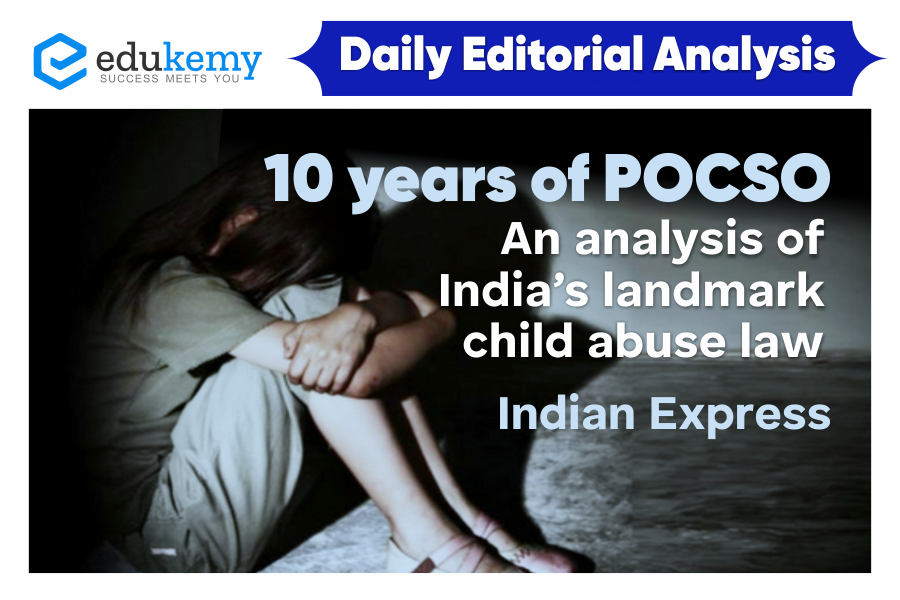
In a decade since its inception, the Protection of Children from Sexual Offences (POCSO) Act in India has stood as a crucial legal milestone in addressing and combating child abuse. The Indian Express, in its incisive analysis, delves into the multifaceted impact of this landmark legislation on safeguarding the rights and well-being of children. By examining key cases, legislative amendments, and societal shifts, the article navigates through the evolving landscape of child protection. It highlights the Act’s successes in providing a legal framework for the swift prosecution of offenders and the enhanced support systems for survivors. Simultaneously, the analysis scrutinizes challenges and gaps, underscoring the need for continuous evaluation and adaptation. As India reflects on a decade of POCSO, the Indian Express offers a comprehensive exploration of the law’s achievements and the ongoing imperatives for ensuring a safer future for the nation’s children.
Contents
- 1 Exam View:
- 2 In News:
- 3 Key features of the POCSO Act:
- 4 Issues related to Child Sexual Abuse:
- 5 Government Initiative:
- 6 Way Forward:
- 7 Question for Practice:
- 8 Frequently Asked Questions (FAQs)
- 8.1 Q1: What is POCSO, and how has it impacted child protection in India over the last decade?
- 8.2 Q2: How has the implementation of POCSO evolved since its inception, and what challenges persist in ensuring effective enforcement?
- 8.3 Q3: What impact has POCSO had on the conviction rates of child sexual abuse cases in India?
- 8.4 Q4: How has the societal attitude towards child sexual abuse changed since the implementation of POCSO, and what more needs to be done to create a safer environment for children?
- 8.5 Q5: In what ways has the POCSO Act been amended or updated to adapt to emerging challenges in child protection, and what future developments can be expected?
- 9 In case you still have your doubts, contact us on 9811333901.
Exam View:
Prelims:
POCSO, National Crime Record Bureau etc
Mains GS Paper I and II:
Vulnerable sections of society, Laws, institutions and bodies constituted for the protection and betterment of vulnerable sections of society etc.
In News:
Ten years after the enactment of The Protection of Children from Sexual Offences (POCSO) Act, an analysis of POCSO cases across India has found gaps in its implementation including:

- Increasing pendency of cases
- High rate of acquittals.
POCSO Act was enacted by the Parliament in 2012 to prevent children aged less than 18 from offences like sexual harassment, sexual assault, and child pornography. The Act was passed in 2012 under the Ministry of Women and Child Development.
Key features of the POCSO Act:
Constitutional Provisions:
- Article 21: The Constitution guarantees every child the right to live with dignity, the right to personal liberty, and the right to privacy
- Article 14: the right to equality
- Article 15: right against discrimination
- Article 23 & 24: right against exploitation
- Article 21A: Right to free and compulsory elementary education for all children in the 6–14-year age group.
- Article 39(f): Obligation on the State to ensure that:
- Children are given opportunities and facilities to develop in a healthy manner and in conditions of freedom and dignity
- Childhood and youth are protected against exploitation and against moral and material abandonment.

Government Initiative:
- Beti Bachao, Beti Padhao: It was launched to address the declining Child Sex Ratio (CSR) and related issues of women’s empowerment over a life-cycle continuum.
- Child Abuse Prevention and Investigation Unit: It will collect and disseminate information on online child sexual abuse and exploitation.
- Child Labour Prohibition and Regulation Act, 2016: The Amendment Act completely prohibits the employment of children below 14 years.
- Child Marriage Prohibition Act (2006): It provides that the minimum age of marriage is 21 years in the case of males, and 18 years in the case of females.
- Juvenile Justice Act/Care and Protection Act, 2000: This Act provides for the establishment of the Juvenile Justice Board to give justice to the juvenile in conflict with the law.
Way Forward:
Comprehensive Framework:
The report calls for prioritising prevention activities against abuse, and creating safe online environments for children, besides calling on all with a role to protect children to work together to dramatically improve the response.
Multi-Stakeholder Approach:
Developing a comprehensive outreach system to engage parents, schools, communities, Non-governmental Organizations (NGOs) partners local governments as well as police and lawyers to ensure better implementation of the legal framework, policies, national strategies, and standards.
Question for Practice:
Prelims:
1. With reference to the United Nations Convention on the Rights of the Child, consider the following: (2010)
- The Right to Development
- The Right to Expression
- The Right to Recreation
Which of the above is/are the Rights of the child?
(a) 1 only
(b) 1 and 3 only
(c) 2 and 3 only
(d) 1, 2 and 3
Ans: (d)
Mains:
1. Examine the main provisions of the National Child Policy and throw light on the status of its implementation.(UPSC 2016) (200 WORDS, 10 MARKS)
Daily Newsletter – Get all your Current Affairs Covered – Click Here
Frequently Asked Questions (FAQs)
Q1: What is POCSO, and how has it impacted child protection in India over the last decade?
A: The Protection of Children from Sexual Offences (POCSO) Act was enacted in India in 2012 to address the rising concern of child sexual abuse. Over the last decade, POCSO has played a pivotal role in safeguarding children by providing a comprehensive legal framework to deal with offenses against minors. It has increased awareness, facilitated reporting, and enhanced the prosecution of those involved in such heinous acts.
Q2: How has the implementation of POCSO evolved since its inception, and what challenges persist in ensuring effective enforcement?
A: The implementation of POCSO has evolved with time, witnessing increased sensitization of law enforcement agencies, judiciary, and the general public. However, challenges persist, including delays in the legal process, stigma associated with reporting, and the need for better rehabilitation measures for survivors. Continuous efforts are crucial to address these challenges and strengthen the overall effectiveness of the law.
Q3: What impact has POCSO had on the conviction rates of child sexual abuse cases in India?
A: POCSO has significantly contributed to an increase in the conviction rates of child sexual abuse cases in India. The strict legal provisions and specialized courts established under the Act have expedited the legal process, leading to a higher rate of convictions. However, there is still work to be done to ensure a swift and fair trial for every survivor.
Q4: How has the societal attitude towards child sexual abuse changed since the implementation of POCSO, and what more needs to be done to create a safer environment for children?
A: POCSO has played a crucial role in changing societal attitudes toward child sexual abuse by bringing the issue into mainstream discourse. There is now greater awareness and willingness to address the problem. However, sustained efforts are needed to continue breaking down societal taboos, encourage reporting, and promote preventive measures to create a safer environment for children across the country.
Q5: In what ways has the POCSO Act been amended or updated to adapt to emerging challenges in child protection, and what future developments can be expected?
A: The POCSO Act has undergone amendments to address emerging challenges in child protection. Amendments have focused on expanding the definition of offenses, enhancing penalties, and introducing measures to expedite trials. Future developments may include further refinements to keep pace with evolving societal norms, technology-related offenses, and a continued commitment to improving the overall effectiveness of child protection laws in India.
In case you still have your doubts, contact us on 9811333901.
For UPSC Prelims Resources, Click here
For Daily Updates and Study Material:
Join our Telegram Channel – Edukemy for IAS
- 1. Learn through Videos – here
- 2. Be Exam Ready by Practicing Daily MCQs – here
- 3. Daily Newsletter – Get all your Current Affairs Covered – here
- 4. Mains Answer Writing Practice – here


